Disclaimer: This post is intended to inform you of the general details and best practices for filing 1099 forms in property management. For the most specific and accurate advice, always consult a certified tax professional.
Start your free trial today!
Try Buildium for free for 14 days. No credit card needed.
Start Your TrialProperty managers are going to be busy in 2026. According to our 2025 Property Management Industry Report, 75% of property managers we surveyed plan to expand their portfolios in the next year. Given the current economic climate, they’re looking to do that by finding creative, tech-led solutions to streamline their businesses while seeking out new clients.
With so much on the horizon for property managers, property management tax reporting, may be the last thing on their minds. But it’s still an essential part of 2026 planning.
That’s why we’ve created a guide (and a video) to help make the 1099 filing process as smooth as possible. To help put your tax plan into action, we sat down with Charlie Walsh, Customer Marketing Manager at Buildium, to get his advice from years of experience helping property managers navigate their tax filing challenges with purpose-built software.
Let’s dive into what you need to know about the 1099-MISC and recently introduced 1099-NEC forms, so you’ll be set up for success in 2026:
Who Needs to File 1099s in Property Management
Property managers must file 1099 forms when they pay $600 or more annually to individual contractors or unincorporated businesses, as the IRS doesn’t require returns for payments less than $600 in a tax year. This includes payments for your own business operations and work done for property owners you manage. The 1099 forms report these payments to the IRS.
Important note: The $600 minimum will be raised to $2,000 for the 2026 tax year.
What Are 1099-MISC and W-9 Forms?
The IRS uses the 1099-MISC to report a variety of income received that isn’t reported on standard W2 forms. While non-employee compensation is now filed under the 1099-NEC (we’ll get to that later), you’ll still need to file a 1099-MISC for:
- Rent income
- Prizes and awards
- Cash paid from a notional principal contract to an individual, partnership, or estate
- Fishing boat proceeds
- Medical and health care payments
- Crop insurance proceeds
- Payments to an attorney
- Section 409A deferrals
- Non-qualified deferred compensation
- Other income payments
For property management tax filing, that means that 1099-MISC forms are the primary method to report:
- Rent provided to an owner from a leased property totaling $600 or more
- Attorney fees totaling $600 or more
Whenever a property manager brings on a new owner or law firm, they should request a W-9 form. The W-9 will give you their filing status and federal tax ID, so you can file your 1099-MISC forms accurately when the time comes.
Property managers are required to request a W-9 form and issue a 1099-MISC form to each owner, attorney, and contractor they work with, so long as payments meet or exceed the $600 threshold. The IRS makes (typically small) adjustments to the 1099-MISC form each year.
For 2025, the form looks like this:
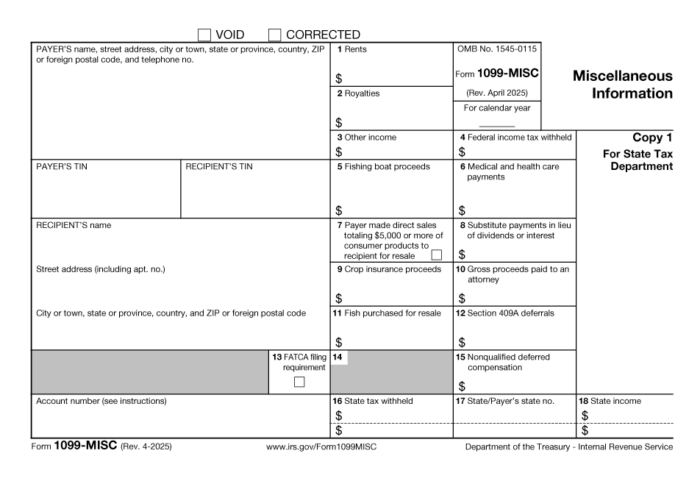
What Is a 1099-NEC Form?
In 2020, the IRS began requiring businesses to report non-employee compensation in a separate form, the 1099-NEC; previously, payers used Form 1099-MISC for this purpose. Here’s how they differ:
We’ve created a detailed breakdown of the form and what it means for property managers here.
Property managers must file a 1099-NEC when they pay an unincorporated independent contractor $600 or more in a year for work done on a rental property owner’s behalf or directly for the manager’s own business. You’ll need to send a 1099-NEC instead of a 1099-MISC if you made a payment:
- Of at least $600 to an individual or organization during the year
- To anyone who isn’t an employee (this can be an individual, a partnership, an estate or, in some cases, a corporation)
- For services provided as part of your business (including to government agencies and nonprofit organizations)
For property managers, those criteria typically boil down to payments made to:
- Maintenance providers such as landscapers, plumbers, and HVAC professionals
- Service providers such as locksmiths, laundry and dry cleaning, or fitness instructors
It’s always a recommended practice to consult a tax professional if you’re unsure whether a particular payment falls into the right category for a 1099-NEC. To give you an idea of what to expect, the form for 2025 looks like this:
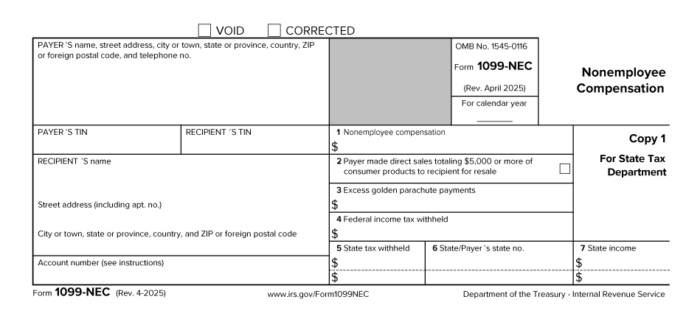
1099 Exemptions for Property Managers
There are a few scenarios in which property managers are exempt from filing a 1099. As mentioned earlier, 1099s aren’t required for any payments less than $600.
If the rental property owner is established as a corporation, you do not need to file a 1099-MISC form for payments made to that company. You’ll still need to file a 1099-MISC if the property owner is a limited liability company, or LLC, however.
You also do not need to file a 1099-NEC form for any maintenance work or other services done by an incorporated business. Again, this exemption does not apply to LLCs.
1099 Requirements for Property Owners
If you own the property you are managing (a private landlord), you do not need to file a 1099 for any work related to that property. This has been the case since the reporting requirements within the Affordable Care Act and Small Business Jobs Act were repealed in 2011.
When determining if a certain payment needs to be reported on a 1099, it’s always a good idea to meet with a tax professional to make sure you are filing correctly and to avoid any penalties.
Deadline for 1099 Forms
The filing deadlines for 1099-MISC and 1099-NEC forms depend on how you’re filing and what information you’re providing in the forms. Take a look at the table below to determine when you should file:
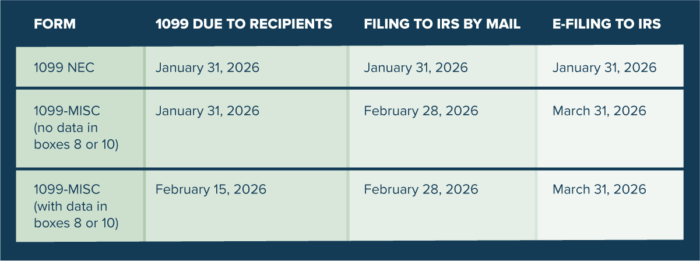
All your 1099 forms must be submitted together, along with one copy of Form 1096, the IRS equivalent of a cover letter. You can obtain an original Form 1096, 1099 forms and any other official tax documents (photocopies won’t work) from the IRS directly through their website.
1099-MISC and 1099-NEC Filing Options for Property Managers
You have several options when filing 1099 forms. You can do it yourself, either by mailing the documents in person or electronically through the IRS’s Filing Information Returns Electronically (FIRE) system or you can hire an accountant or a CPA to do it for you.
It’s almost always easier, however, to file 1099s electronically (eFile) and the IRS requires you to do so if you’re filing 10 or more 1099-MISC forms.
It’s also a good practice (and recommended by the IRS) to keep copies of your 1099-MISC and 1099-NEC forms for at least 3 years (4 years if backup withholding was imposed).
eFiling through property management software can make each step of the process easier, allowing you to fill out 1099s in minutes and get them postmarked the same day. This not only speeds up the process for property managers, but also reduces the time and effort vendors, owners, and other partners have to spend.
“Often, property managers struggle with knowing who to file 1099s for and for how much,” says Walsh. “That’s where the right software comes in handy. It automatically calculates how much an owner or vendor has been paid throughout the year, and brings them up when you start filing.”
How to File Create and Send 1099s in Buildium
Using existing, purpose-built software is often the fastest and most cost-effective way to go. Through Buildium’s property management software, you can generate and send 1099s, including both the 1099-MISC and 1099-NEC, to all of your owners, vendors, and contractors. Buildium also lets you start the process a whole month earlier than when filing officially opens with the IRS, so you can get a jump on tax season.
“It’s one of the biggest benefits of e-Filing with Buildium,” Walsh notes. “You can start preparing your batches, make sure tax info for your owners and vendors are up-to-date, double and triple check your transactions, and more. Taking care of this throughout December means you’ll save time and stress come January.”
Buildium calculates 1099 tax totals based on the accounting data it has collected throughout the tax year. If you haven’t been using Buildium all year, not to worry. You can edit the amounts at any time.
Creating and filing 1099s takes just a few simple steps in Buildium:
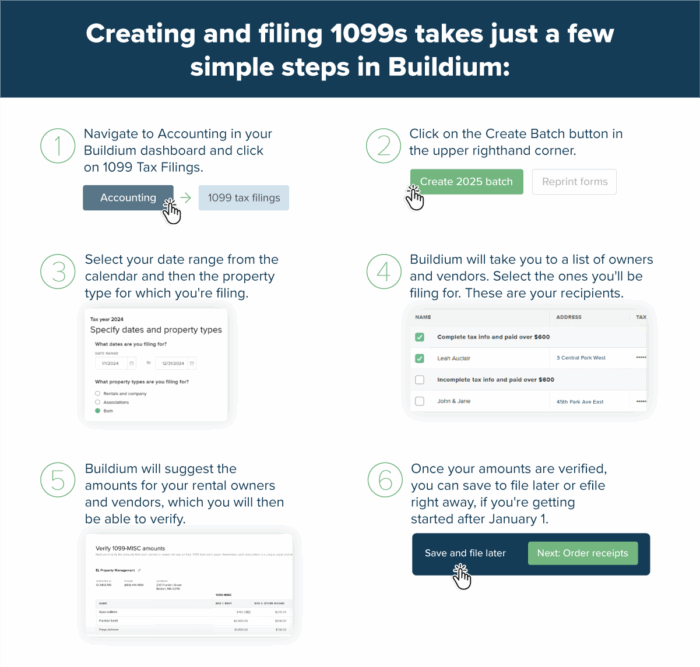
- Navigate to Accounting in your Buildium dashboard and click on 1099 Tax Filings
- Click on the Create Batch button in the upper righthand corner.
- Select your date range from the calendar and then the property type for which you’re filing.
- Buildium will take you to a list of owners and vendors. Select the ones you’ll be filing for. These are your recipients.
- Buildium will suggest the amounts for your rental owners and vendors, which you will then be able to verify.
- Once your amounts are verified, you can save to file later or efile right away, if you’re getting started after January 1.
Staying on top of tax reporting is important for any size property management company. Penalties for not filing 1099 forms can range from $60 to $680 per form and deductions tied to the income can be disallowed if you fail to file, meaning the owners you work with won’t be able to claim the property expenses as tax deductions.
Walsh calls out that one of the main things property managers should look out for in this process is time allocation: “It’s human nature to believe you’ve got a lot of time to take care of something, but what we end up seeing a lot of is people end up putting off e-Filing their 1099s until the last minute,” he says. “That can potentially lead to errors in filing, which could end up costing more in the long run in the form of fees for ordering corrections. 1099s should be on your mind and getting checked off your to-do list all throughout January.”
Luckily, property management software such as Buildium makes it easy to kick off the filing process early, does a lot of the heavy lifting for you, and keeps you well ahead of deadlines.
The trick is to find a platform that’s simple to use, so you’re not stuck having to learn new tools on top of filing taxes. Ease of use is one of the major benefits that Walsh has noticed across the customers he’s worked with, regardless of portfolio size or experience level: “Customers find the thought of filing 1099s daunting until they do it with Buildium. The software takes the data you’ve already entered throughout the year and suggests which individuals to e-File for when you start creating batches.”
Here’s a peak into what the platform looks like in Buildium’s platform:
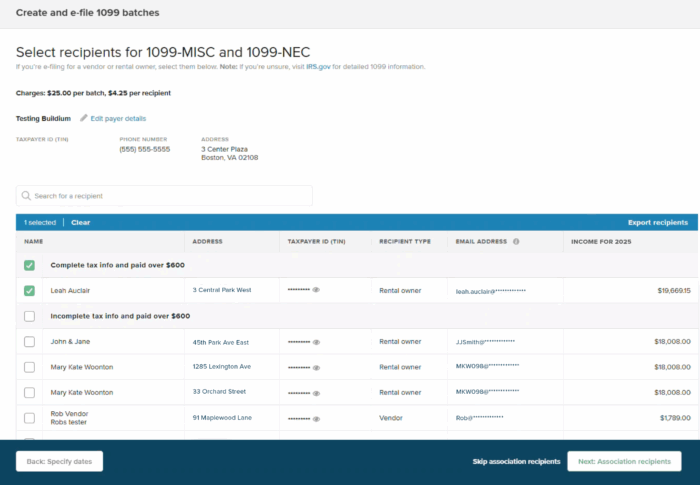
Remember, knowing the ins and outs of your tax requirements is only half the battle. Choosing the right software—a platform that keeps your records organized and automates the hard parts of filing for you—is ultimately the best way to stay compliant and free to turn your attention to what matters. Rather than looking back at last year’s books, you can focus on achieving your business goals in 2026.
If you want an easier way to file your property management taxes this upcoming season, give Buildium toolkit a try with a 14-day free trial or by signing up for a guided demo.
Frequently Asked Questions
What is a 1099 form in property management?
A 1099 form reports payments over $600 made to contractors, vendors, or service providers for rental property work.
Who needs to receive a 1099 form?
Non-employee contractors, vendors, and service providers who received $600 or more annually for rental property services.
When do I need to send out 1099 forms?
1099 forms should be sent out to the recipients by January 31st of the year following the tax year in which the payments were made. The IRS copy of the form should be submitted by the end of February if filing by paper, or by the end of March if filing electronically.
What information do I need to prepare a 1099?
To prepare a 1099 form, you’ll need the contractor’s or service provider’s name, address, and taxpayer identification number (TIN). You’ll also need records of the total amount paid to each recipient during the tax year.
Can software help with 1099 preparation?
Yes, there are various software solutions available that can assist with generating, managing, and filing 1099 forms. These tools can simplify the process by tracking payments and automatically populating the necessary information for each form.
What happens if I don’t file a 1099 form?
Failing to file a 1099 form can result in fines and penalties from the IRS. It’s important to comply with the reporting requirements to avoid these issues and keep accurate records for your property management business.
Read more on Accounting & Reporting